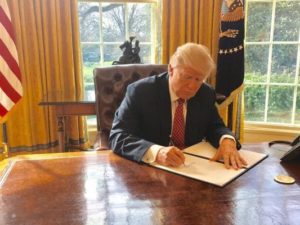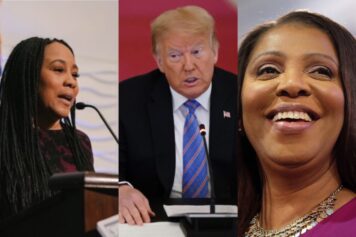
President Donald Trump’s revised travel ban still prohibits travelers from six majority-Muslim nations from entering the U.S. Photo by Sean Spicer/Twitter.
President Donald Trump signed a revised version of his executive order barring immigrants from seven Muslim-majority countries in the Middle East and Africa on Monday, March 6, this time removing Iraq from the original list of banned nations.
The president also moved to scrap the controversial provision granting certain protections to religious minorities fleeing persecution, The New York Times reported.
The revised order comes just a month after federal judges blocked the president’s efforts to ban Syrian refugees from entering the U.S. and temporarily block travel from seven Muslim majority nations — Iran, Iraq, Libya, Somalia, Sudan, Syria and Yemen. Trump’s immigration polices sparked nationwide protests days after he signed the order Jan. 27, leaving hundreds of teary-eyed travelers stranded at airports around the U.S. and abroad.
Government officials said Monday that the new measure would be phased in over the next few weeks and would not affect those who had already been issued visas to enter the U.S. The president’s administration was hopeful that the recent changes might help avoid total chaos and the numerous legal battles experienced the first time around.
Homeland Security secretary John F. Kelly called the revised policy “prospective” and said it solely applied to “foreign nationals outside of the U.S.” who don’t possess a valid visa.
“If you have a current valid visa to travel, we welcome you,” Kelly said Monday while standing alongside Secretary of State Rex Tillerson and embattled Attorney General Jeff Sessions.
“Unregulated, unvetted travel is not a universal privilege, especially when national security is at stake,” he added.
The new ban still explicitly exempts travelers/citizens of the six banned nations from getting their hands on a visa for the next 90 days, CNN reported. Those whose visas were revoked as part of the initial ban are also barred from entering the country.
While the revised measure retains the temporary blanket ban on all refugees, Trump scaled back his indefinite ban on Syrian refugees to a 120-day suspension instead, which will require review and renewal.
After three weeks of delay, Trump finally signed the legislation amongst reporters in the Oval Office. CNN reported that the revised order came amid intense lobbying efforts from Iraqi government officials pushing the White House to remove Iraq from the original list of banned nations. The president decided to do just that after Secretary of State Rex Tillerson said the State Department, in conjunction with the Iraqi government, did a thorough review to improve the vetting process for Iraqi citizens. Tillerson stopped short of saying how the vetting process was improved, however.
“The United States welcomes this kind of close cooperation,” he said. “This revised order will bolster the security of the United States and our allies.”
In addition, the nation’s refugee program will be halted for 120 days and will not accept more than 50,000 refugees in a year — a far drop from the 110,000 limit set by the Obama administration, The Washington Post reported. The order goes on to name specific sets of people who’d be able to waive the order on a case-by-case basis, including individuals who were previously admitted to the United States for “a continuous period of work, study or other long-term activity,” those with “significant business or professional obligations” and those seeking to live with family, according to the newspaper.
Despite the changes made to Trump’s immigration ban, Democrats and immigration advocates asserted that the new policies were just like the old: nothing more than a ban on Muslims.
“While the White House may have made changes to the ban, the intent to discriminate against Muslims remains clear,” said New York Attorney General Eric T. Schneiderman (D), who voiced opposition to the initial ban. “This doesn’t just harm the families caught in the chaos of President Trump’s draconian policies — it’s diametrically opposed to our values, and makes us less safe.”
The new order will take effect on March 16.


